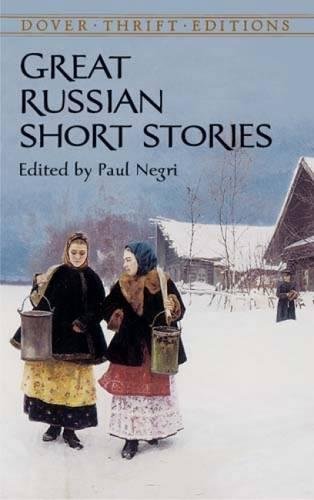 I picked this up for .50 at a used book sale, thinking I should read it for two reasons: the stories are from the nineteenth century, the era I study (were the Victorians reading any of these authors?), plus they’re considered works of great Russian literature, something I ought to be familiar with given that my spouse is a work of great Russian parenting.
I picked this up for .50 at a used book sale, thinking I should read it for two reasons: the stories are from the nineteenth century, the era I study (were the Victorians reading any of these authors?), plus they’re considered works of great Russian literature, something I ought to be familiar with given that my spouse is a work of great Russian parenting.
I was disoriented while reading some of these stories: what, for example, is going on in Pushkin’s “The Queen of Spades”? Is this supposed to be a ghost story? Some kind of moral fable? Is Pushkin taking a stab at Germans? At wealthy old women? Am I dissatisfied with the plotting and characterization because as a reader I am conditioned by a different literary culture? Is my problem just that I don’t know enough about the historical/cultural context, as my spouse claims? Do my college students feel this confused when I immerse them in the world of Indian literature? I read this story twice, and I’m still befuddled, but I decided to read on, and see if there was anything I could get inside of and understand better.
I liked Gogol’s “Overcoat.” I recall thinking I ought to read this story when Jhumpa Lahiri’s The Namesake came out (of course I didn’t, because I was immersed in PhD exams covering both the Victorian era and Post-colonial Literature/Theory–who has time for Gogol then?). I loved the main character, how simple-minded he seems, his commitment to eternal copying for some government department. The story brought to mind Flaubert’s Bouvard et Pécuchet and particularly Foucault’s reading of the novel in “The Fantasia of the Library” as a book produced from other books, writing about writing, a meta-derivative as a crisis and condition of modernity. This is maybe even the constitutive condition of all writing (including this blog): repetition and inventory. And then Gogol’s antagonists get their comeuppance in the end, and that’s satisfying to read.
I felt that same disorientation while reading Turgenev’s “The District Doctor.” Then, Dostoyevsky’s “White Nights” seemed overwritten (well, like everything else by Dostoyevsky, actually). The narrator is a passive-aggressive mansplaining booby. ALL readers are Nastenka, at the point when she interrupts the narrator to say, “Listen. You describe it all splendidly, but couldn’t you perhaps describe it a little less splendidly?” I loved how this story ends, and I loved that it was finally over, too. If I had to write an essay about this story, it would focus on the representations of architecture/the built environment as animate. Speaking of architecture, I love that a number of the stories are set in St. Petersburg because I spent a week there two summers ago, and this gives me nostalgia and inspires me to consider developing a study abroad course there.
Tolstoy’s “How Much Land Does a Man Need?” reminded me a little bit of Pearl S. Buck’s The Good Earth. I feel like this story would be fun to teach in First-year Composition.